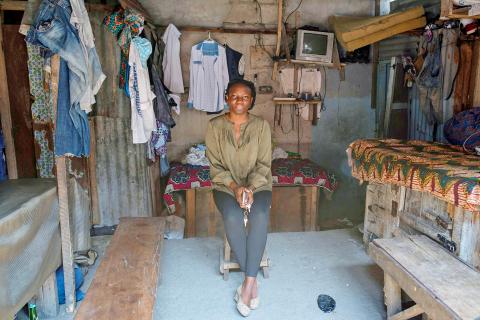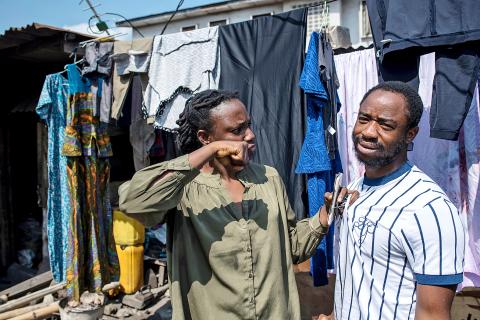A low budget comedy set in the working class suburbs of Nigeria’s capital, Ema Edosio’s debut film Kasala! is a world away from the usual style and glamour of Nollywood.
Instead it almost oozes sweat, dust and marijuana with the smell of rotting meat and engine oil in what is effectively a love letter to Lagos that reflects a growing interest in social realism.
The film, whose title means “problems” in local street slang, is set in the streets of Ojuelegba, a working class suburb in Lagos’s densely populated “mainland.”

Photo: AFP
Wandering through the neighborhood, residents greet this 34-year-old director like a local. Even though Edosio herself lives on the “islands” — the more well-to-do area of this megacity of 20 million people — it is a reality she knows well after growing up in a similar area with her eight siblings.
“Eighty percent of Lagos is like this but it’s... under-represented in the cultural scene,” she said.
“I want to be the voice that puts their life to the screen.”

Photo: AFP
The plot, which unfurls over 24 hours, involves four young friends who are out for a good time and steal a car belonging to one of their uncles. But they end up having to find 20,000 naira (US$55) to fix it when they have an accident.
TJ and his friends are typical teenagers but even a youthful error of judgment can have serious consequences in a poor neighborhood of Lagos. The uncle is up to his eyes in debt and risks being killed if he doesn’t sell the car.
The film shows young Africans stuck in poverty, debt and second-hand clothes, dreaming of a better life just like their idol, Afropop superstar Davido.
Above all, it is a film about friendship in which the resourcefulness of Africa’s big cities is ever-present.
SOCIAL CINEMA
Gritty realism is exactly what attracted Abiodun Kassim, who plays the poor, indebted uncle who is trying to make ends meet at his filthy meat stall in the local market.
“My character represents the backbone people of Nigeria. It’s the daily life story of all these people who force their way through life,” he said. “These... are the majority, but people don’t talk about them.”
Since its release, Kasala! has won critical acclaim in the Nigerian press. “2018 has not been a very good year for Nollywood,” wrote Oris Aigbokhaevbolo on the Bella Naija Web site. “But Kasala! might yet save the year.”
Writing on the Lagos Film Society Web site, Dare Dan hailed Edosio’s “razor-sharp sensitivity to what life is like in these neighborhoods from the very first shot.”
“Comedy, rooted in realism, is not something we often come across on Nigerian screens,” he said.
‘REFRESHING, AUTHENTIC’
Yet no local cinema has agreed to show Kasala!
“Everywhere I am told that people want to see inspiring movies,” said Edosio, which for most Nigerians means showing wealthy people.
“This kind of social cinema is struggling to emerge,” said Serge Noukoue, the organizer of the annual Nollywood Week film festival in Paris.
“It’s not in the DNA of Nollywood, which aims to entertain.
“We’re still in the ‘high life’ wave of Nigerian cinema — very sophisticated, in fashionable areas, women wearing lots of make-up.”
At the festival, however, Kasala! was singled out as one of this year’s “must watch” films.
“It’s a refreshing, authentic film,” said Noukoue. “Ema Edosio is a ‘new voice’ in the universe of Nollywood. That’s a good and very positive thing.”
COUNTER CURRENT
Abba Makama, director of Green White Green (2016), said he was “sick and tired” of “glossy and shiny” productions using actors with British or US accents.
He describes his film, whose title refers to the colors of the Nigerian flag, as his “mosaic of madness.”
It was one of the first examples of a small but growing movement of social realism to hit the cultural scene in Africa’s most populous nation.
The film has been shown at about 20 festivals across the world, including in Toronto, and is available on Netflix.
But again, it has never been shown on the big screen in Nigeria, despite its huge success.
“In the 2000s, there were only about 20 cinemas in the whole country,” said Makama.
“Now, we have multiple portals, Africa Magic, YouTube, more cinemas... However the movies are pretty much the same. We do need an alternative cinema distribution platform.”
Edosio agrees, confident there is an audience for her films and those of others who are also swimming against the tide: it just requires success to prove it to distributors.

May 18 to May 24 Pastor Yang Hsu’s (楊煦) congregation was shocked upon seeing the land he chose to build his orphanage. It was surrounded by mountains on three sides, and the only way to access it was to cross a river by foot. The soil was poor due to runoff, and large rocks strewn across the plot prevented much from growing. In addition, there was no running water or electricity. But it was all Yang could afford. He and his Indigenous Atayal wife Lin Feng-ying (林鳳英) had already been caring for 24 orphans in their home, and they were in

On May 2, Chinese Nationalist Party (KMT) Chairman Eric Chu (朱立倫), at a meeting in support of Taipei city councilors at party headquarters, compared President William Lai (賴清德) to Hitler. Chu claimed that unlike any other democracy worldwide in history, no other leader was rooting out opposing parties like Lai and the Democratic Progressive Party (DPP). That his statements are wildly inaccurate was not the point. It was a rallying cry, not a history lesson. This was intentional to provoke the international diplomatic community into a response, which was promptly provided. Both the German and Israeli offices issued statements on Facebook

Even by the standards of Ukraine’s International Legion, which comprises volunteers from over 55 countries, Han has an unusual backstory. Born in Taichung, he grew up in Costa Rica — then one of Taiwan’s diplomatic allies — where a relative worked for the embassy. After attending an American international high school in San Jose, Costa Rica’s capital, Han — who prefers to use only his given name for OPSEC (operations security) reasons — moved to the US in his teens. He attended Penn State University before returning to Taiwan to work in the semiconductor industry in Kaohsiung, where he

President William Lai (賴清德) yesterday delivered an address marking the first anniversary of his presidency. In the speech, Lai affirmed Taiwan’s global role in technology, trade and security. He announced economic and national security initiatives, and emphasized democratic values and cross-party cooperation. The following is the full text of his speech: Yesterday, outside of Beida Elementary School in New Taipei City’s Sanxia District (三峽), there was a major traffic accident that, sadly, claimed several lives and resulted in multiple injuries. The Executive Yuan immediately formed a task force, and last night I personally visited the victims in hospital. Central government agencies and the